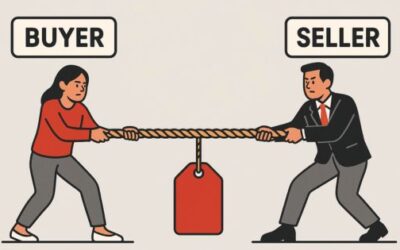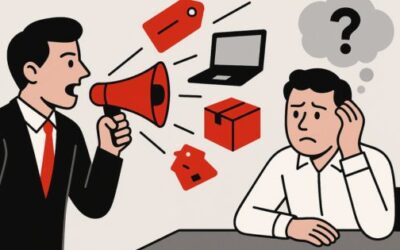We can’t say this loud enough, B2B sales is changing. Relentlessly pushing products and hammering prospects with your rehearsed sales pitch is dead. Developing a successful sales approach needs to focus on consultative selling and it’s 3 key components – listening, asking good questions, and engaging in a genuine conversation.
Evolution of Sales
It’s late 2023, sales should be vastly different than it was. In some ways it has changed, but it wasn’t that long ago that gurus were still focused on a pitch, the hustle of a salesperson, and tirelessly pushing product. The one-size-fits-all sales strategy should no longer be the norm.
The marketplace has undergone a huge transformation. Persuasive tactics and the product-centric approach does not work anymore. Sales is now a problem-centric and consultative selling environment.
Consultative Selling
So what is consultative selling and why is it so important? At it’s core, consultative selling is a customer-centric approach that prioritizes understanding the unique challenges and problems of each prospect. Acting as a trusted advisor and guiding potential customers through a discovery process and customer journey rather than just making a sale.
Shifts in Buyer Behavior
This evolution of buyer behavior is rooted in the accessibility of information. Buyers are more informed than they have ever been. They don’t want or need a salesperson to inundate them with product features, they want an expert who can add value, provide insights, and offer a tailored solution.
As a result, traditional sales tactics that once worked have lost their shine. Buyers are not interested in being “sold to.” They crave a meaningful conversation and solution that addresses their unique challenges.
Active Listening for Salespeople
Active listening is the cornerstone of success in a selling consultant role. Genuinely tune in to what prospects are saying and, potentially more important, what they aren’t saying. This is more than hearing words, it’s about understanding the emotions and challenges that will drive buying decisions. In this new selling world, active listening is the quickest way to build trust and foster genuine connections with buyers.
Shifting from Product-Centric to Problem-Centric
As sellers, we want to shift the focus from the product or service to the customer. Prioritize building genuine relationships on credibility and delivering value at every stage of the sales process. To shift from product-centric to problem-centric your sales team needs to build on these skills:
- Empathy – take the time to understand and relate to the prospect’s challenges.
- Active listening – we often hear the things we want to hear and start to formulate a plan to sell to that. Stop. Keep listening, be empathetic to your buyer and hear their whole answer.
- Questioning – be purposeful in your questions and know where you want to take the conversation. Build a PIC chart and develop your questioning framework to uncover if the buyer has any of the problem you can solve.
- Problem-solving – tailor your solution to the customer’s exact problems. Do not, ever, highlight a feature or benefit of your product that does not tie back to the customer. You will immediately lose credibility if you start talking about something that is irrelevant to them.
- Trust Building – you do not need to be liked to sell. You do, however, need to be trusted. By acting as a consultant and market expert you will naturally gain the trust of the buyer. But, as soon as you start to sell, you’re walking a tight rope. Stay out of sell mode.
Thoughtful Sales Questions
Asking good questions is crucial in Gap Selling. Questions are more than just gathering information, they are a foundational piece of a meaningful conversation that lead to deeper understanding and stronger relationships.
Thoughtful questions invite prospects to share insights about their challenges, goals, and problems. These insights are where you begin to frame your solutions. They are a simple show to show genuine interest in your prospect and their business. It signals to them that you are there to help and not just to make a profit off of them. Engaging in a dialogue, rather than talking at a prospect, helps to build rapport and trust. Gap Selling hinges on 4 types of questions:
- Probing questions: designed to gather a broad range of information about the company, issues, problems, and expectations.
- Process Questions: focus on understand how the buyer executes their processes, uncover technical issues, and position your product effectively.
- Provoking Questions: challenge the buyer to consider unexplored outcomes, impacts, and risks, encouraging a broader perspective.
- Validating Questions: use close-ended questions to confirm and anchor what the buyers has said, ensuring a clear understanding.
Ditch the Sales Pitch
Traditional sales pitches are one-sided affairs where the salesperson does most of the talking. They’re relying heavily on a premeditated script designed to persuade and convince a prospect to buy. These pitches are off-putting to a modern buyer who seeks an authentic, meaningful interaction.
Consultative sales and problem-centric selling approaches redefine the sales process as a conversation. A two-way exchange that fosters engagement and a mutual understanding. Being a consultant means listening takes precedence over talking. Rather than bombarding prospects with a laundry list of product features, we need to emphasize the value loss by standing pat in their current situation and how we can alleviate that loss. We take a tailored approach to highlight how specific features can address root causes of their overall business problems.
If you take one thing from us, let it be this, a modern B2B sales process demands a more nuanced and personalized approach than ever before. In this weeks episode of Gap Sell Keenan, we see our seller trying to sell and not taking the time to understand what problems ASG and Keenan were facing.





0 Comments